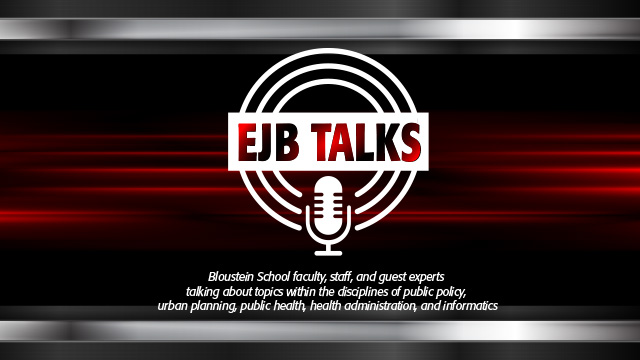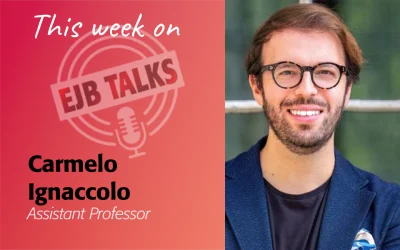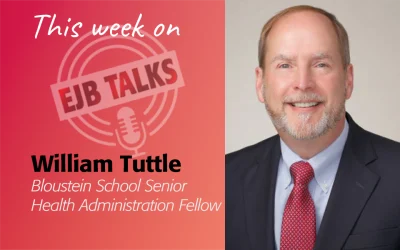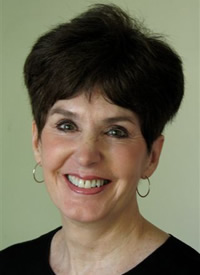
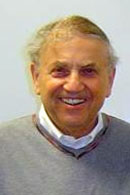
On this episode of EJBTalks, Stuart Shapiro welcomes back two of our most popular guests. Linda Stamato and Sandy Jaffe founded and ran the Bloustein School’s Center for Negotiation and Conflict Resolution while teaching at the school since its founding in 1992. Linda and Sandy reflect on their far-reaching careers and how the fields of planning and policy in general — and the Bloustein School — were the perfect fit for them and their work. The two explore the current state of politics with Stuart and aim to comfort but also affirm that to have democracy, there must be conflict. It is through conflict that advancement in public welfare occurs. Finally, the pair share the excitement they have had working with colleagues and the optimism and joy they experienced teaching their students at Bloustein.
Stuart Shapiro
Welcome to EJB Talks. I’m Stuart Shapiro, the Associate Dean of the Faculty at the Bloustein School, and the purpose of this podcast is to highlight the work my colleagues and our alumni in the fields of policy, planning, and health are doing to make the world, the country, and New Jersey a better place.
This week in our continuing series of talking with recently retired and retiring faculty, today I’m honored to be speaking with the guests of one of our most downloaded episodes. Linda Stamato and Sandy Jaffe. Linda and Sandy founded and ran the Center for Negotiation and Conflict Resolution, and taught at the Bloustein School for many years. Welcome back, Linda and Sandy.
Linda Stamato
Thank you Stuart.
Sandy Jaffe
Thank you.
Stuart Shapiro
So let’s start with the origin stories here, as I’ve been doing throughout this season. How did CNCR come to the Bloustein School?
Sandy Jaffe
Linda, why don’t you start.
Linda Stamato
Well, okay, so, yes… origin story. Indeed, Stuart. Actually, we had a small Center at NYU, previous to our going to Rutgers-Newark because the Dean of the Law School had an interest in alternatives to litigation. So we were kind of on that track when we were at Rutgers-Newark. But when the Bloustein School was created, it made, it seemed a natural fit for this kind of work; negotiating, mediating arbitrating to move to a public policy and planning school. It was too narrow in the law school, and it was sort of an other than legal process. When it was becoming clearly, no, this is more about decision making, this is more about making decisions better, more collaboratively, so that you reduce the incidence of conflict. So in planning and policy domains, it was a perfect fit. And I think we’ve got to say, we felt that that fit was just fine, right from the beginning. And I think we were the first center in the school, actually, right Sandy?
Sandy Jaffe
Yes. I think also just, I want to talk about some of the personalities. As you know, Stuart, Linda and I were both on the Board of Governors at that point. And we had a long conversation with Ed Bloustein. And Ed was not only an excellent scholar but also had been a law professor. And so Ed, I think, appreciated the role, negotiation and conflict resolution could play in policy development. And so through Ed’s efforts, we met Mark Lapping, who was the first Dean of the Bloustein School. And from that, we were given an invitation to come to New Brunswick and create the Center for Negotiation and Conflict Resolution. I think there was a lot of support and a lot of interest at that point.
Linda Stamato
Yes, I think that’s right. And I guess Ed Bloustein had enough experience dealing with conflict with us on the board.((laughing)) That was for sure. But it was sort of interesting Stuart, because at the same time, Sandy, you probably know, was at the Ford Foundation, and he was giving grants, basically, to Community Justice centers. Particularly the first one created in San Francisco. And the idea here was, build capacity in communities to start managing their own conflicts. And in some cases, they began by training local people as mediators, and they would get cases from the police, that were really minor things that weren’t going to be really prosecuted, but still needed attention because they could grow to a major conflict.
So there were these pockets of grants that he was making in conflict resolution, in community and environmental justice, because typically, when you get into land use issues, it makes sense to have community people involved in trying to figure out how to resolve them. And again, that seemed to be conflict resolution. So at the time, we were thinking about creating a center, there was also a national push to begin to think about these things more substantially.
And that got us and I’ll jump a little bit here, that got us to think about creating something called the National Institute for Dispute Resolution, which was funded by the Ford Foundation and a couple of other foundations to get this program off the ground. Seed community justice programs, seed colleges, and university centers led to the creation, I think, when the Hewlett Foundation joined about 21 centers like ours, and some had different areas of focus. Some were planning, some were social justice, some were agriculture, but I think only about five of us now survive. And in the sense that it’s both a gain and a loss because the ones we lost became more integral to the teaching of those universities, so they didn’t need a separate center. In other cases they remain somewhat separate, Harvard is like that we’re like that, and North Carolina is like that, so…
Sandy Jaffe
I think on a light note, Stuart, what was really unusual was not only did Linda and I come, but I was in a position to bring money at the same time. ((laughing))
Linda Stamato
((laughing)) Not a small detail.
Sandy Jaffe
Right, that really appealed to Ed Bloustein, it appealed to the chancellor. And I think that helped us also get started. That’s on the light side.
Stuart Shapiro
Yeah, money’s always welcome. The simple fact of higher education back then. And even more true today. The words conflict resolution are right in your center’s name. And as we look outward to the country right now, what do you think about sort of the level of conflict that we see between Americans now, whether it’s at school board meetings, town meetings, the halls of Congress, wherever it is, does what we’ve seen over the past few years alarm you?
Linda Stamato
It does.
Sandy Jaffe
Yes. Oh, yes, go ahead, you start.
Linda Stamato
Sure, you know, at one level, you know, we need to see that conflict is a good thing in the sense that people are going to have different points of view, and we have got to resolve them. And that usually gets on a more constructive track. I mean, the notion that you want to eliminate conflict, that’s what happens in autocracies. We want to have a democracy. So we’re going to have conflict. But the thing is, it’s clearly shifting to a battle. And it’s not for ideas, particularly, but it’s for dominance. I’m afraid of party affiliations that are leading the nation in a direction that is not a good one, to say the least. So I mean, at some level, we’re trying to focus on how does this affect teaching, how does it affect our roles and our communities, and so forth? And I think that’s where we’re concentrating our efforts. But Sandy, you were going to say…
Sandy Jaffe
Yes, I think, Stuart, there’s no question about your premise being accurate. On the other hand, as Linda said, you know, conflict also presents opportunity, because it’s through conflict, that you’re able to advance social justice issues and move society forward. I think what’s so important about what we were teaching, and what I think is gonna happen, is that we were trying to develop an ability and students to learn how to negotiate, how to develop teams, how to do cooperative work together, and how to deal with conflict on many different levels. And I think we emphasize analysis, we emphasize problem-solving. And I think these are the key factors to deal with the kind of conflict we have today.
I think a good example is what happened in the infrastructure bill, where through efforts–I forget the name of the congressman from New Jersey–they set up something called the problem-solving caucus. And as a result of the work of the problem-solving caucus, there were enough votes in Congress to get the bill through. And I think that harbinger, that’s the future. How do you deal with conflict? How do you deal with creating a process that’s going to enable you to do effective implementation of public policy? And it’s one of the things I try to stress when we teach.
I think in a policy school, I think it’s very important. We have the data, we have the ability to formulate good policy based on that data, and based on analysis, but I think what we have to have is a way of implementing policy. That’s really one of the key issues. And I think that’s what we’re facing in this country. That’s what I think we need to teach people.
And again, an example, as you’re familiar with the legislature in New Jersey and the PUC have passed legislation on offshore wind turbines. Well, you can get the legislation passed, you can get the PUC to articulate a policy, but you still have the problem of how do you implement it? How do you go dealing with all the conflicts that are going to arise by dealing with this issue? And that’s what we’re trying to get over? I think there’s an opportunity now to be able to teach people how to deal with that conflict. And that’s what we were trying to focus on.
Linda Stamato
So, I guess one of the problems though is, who is really actively engaged in good faith in solutions? And I, you know, I tend to think that if you can get people with a certain degree of good faith, who…. well let’s, for example, let’s take the abortion question. I guess maybe three, four years ago, there was an effort by the Star-Ledger to bring together people over to try to figure out how can we deal with the most contentious issues you know, that plague the nation. And they had a list of them and they asked us to lead off… and how do we deal with the challenge with abortion? Thanks a lot. You know, (((laughing))) that was really appreciated.
But the more we looked into it, the more we realize that if you had people with really divergent beliefs and value systems and political affiliations, but they still wanted to try to come together to see if there was something they could accomplish. And so we looked around to see whether there had been kind of local projects. And it turned out in Massachusetts, there had been one that had been ongoing because there had been shootings outside of abortion clinics. And so people of all faiths got together to say, let’s see what we can do to minimize the violence around the issue.
So these people met for five years, believe it or not, and they didn’t come up with a solution to what to do about abortion, but they came to an agreement on how to reduce the likelihood that it would need to occur. And so they got very active together, in making sure contraceptives were available to people who needed them and a variety of other things. So they began to work on pieces of the problem that they could find common ground on, even though they were not going to abandon their values as to whether it was a good thing or not a good thing. And so that makes you think about if you can get people, again, you need a certain degree of good faith here, to sit together to listen to one another and try to frame issues in a way that they are open to discussion and deliberation, you may be able to get agreement on some ultimate objectives, and figure out some partial steps along the way that can help you build a relationship to get there.
Sandy Jaffe
I just want to add one thing to that if I can. I think the key there is the ability not only to form a cooperative relationship, but the key is how do you learn how to analyze. You have to analyze an issue and look at it from all different perspectives. And the better you are at analyzing, the more you will come up with options. And the more you can come up with options and different perspectives and different ways of looking at a problem, the more likely you’re going to be able to get a piece of that problem to resolve. So I think that’s a key. And I think that’s an important point we have to do at the Bloustein School, we’ve got to teach students how to do those three things. So they have the ability to deal with these complex issues.
Stuart Shapiro
So I agree with everything you two have said. But then to take the infrastructure bill that you mentioned as an example, immediately after it passes. One Congresswoman doxes 13 of her Republican colleagues that voted for the bill, and they and their staffs spend the next week fielding death threats and threats to their families.
Sandy Jaffe
Sure.
Stuart Shapiro
You know, I want to believe that all this hope is possible, but at the same time, that’s not something we’ve seen in my lifetime.
Sandy Jaffe
I think that’s accurate, you know, Stuart, but you know, there been other periods, you know American history, as well, as I do probably better…. there are periods…
Stuart Shapiro
Oh, I doubt that Sandy. ((laughing))
Sandy Jaffe
Well… I’m not going to go back to Abe Lincoln and Noah Feldman’s book, which is very interesting, revealed how Abe Lincoln dealt with the Constitution. But those were really very difficult times.
Linda Stamato
McCarthyism.
Sandy Jaffe
And McCarthyism. You know, those of us who, like Linda and I, who remember McCarthyism, and what the implications of that were, and how people reacted all around. So these are, these are periods in American history, which I think we have the ability to get over with. But I think we have to figure out the processes. I’m a great believer of trying to figure out the processes. I know one of the things we talked about, you know, is the role of advocacy and litigation. I think one of the things we also have to realize is that different processes work for different goals. So you have advocates, and that you can advocate for position, you have litigation, but these processes have limitations. One of the things in my mind give you my give my own experience.
One of the things I was active in at the Ford Foundation was in funding and creating public interest law. And when public interest law started, these were a group of young people who were primarily interested in litigation. And saw litigation because of the civil rights model, saw litigation as a means of achieving a particular set of goals. And that worked. But pretty soon, a couple of really bright people said, “Hey, wait a minute, we can litigate, and we can stop a development. And we can stop the funding of waste site. And we can stop this, but we can’t build affordable housing. We can’t build a good waste site. We need a process now to help us develop how do we build this?” So we all understand that litigation has a role and then settlement has a role and figuring out a process in conflict resolution to figure out how to do the next steps. And so today, in my experience, a lot of the public interest law firms, will have sections within the firm that looks at what are the goals and what’s the best process for achieving those goals. This gets us back to your question.
Linda Stamato
But you know, Stuart, one of the things that’s really interesting, the more days pass since the passing of that infrastructure bill, you get a lot of different perspectives. Last night, I was listening to a couple of mayors and the mayors of cities all over America saying, “This is what we’ve been trying to get for how many years, and Republicans trying to and Democrats, we didn’t get it. We now have it.” And when they were pressed, well, how are you dealing, because there were Republicans and Democrats there, how are you dealing with the pushback? Republicans are saying we’re paying no attention. Because those people who voted against the bill are coming back here and and touting what it’s going to bring to their district, even though they voted against it. And they said, you know, what, we’re just paying no attention. We’re going on doing what we need to do for the citizens of our cities. And the mayors are united on this.
And I thought, Okay, well, we haven’t heard too much about the mayors. We keep hearing about Marjorie Taylor Green and her attacks on her colleagues. But you know, what, maybe, you know, we’re beginning to see some evidence that’s encouraging. For example, Info Wars is now going to have to pay for its false representations of what happened in Connecticut. And I think that’s going to be headlines. And that’s going to be important. I noticed Chris Christie has a book coming out in which he’s basically saying, you know, it’s time not to look back, we need to look forward. And I think you’re going to see from several sectors, some movement ahead, because I think fundamentally, what the negative side of all is, it has no vision, it has no purpose, other than being negative, and being No. And, and declaring war on some unknown body of socialists or communists, which no one seems to be. And, you know, say they’re going to shoot people.
So I don’t think you can live long with that. I mean, it seems to me, people, by and large, have families to raise, they have problems to solve, they have roads to fix, and they’re going to be focused more on that in the days ahead. But it’s not going to be easy. I mean, I recognize that. But I’ll tell you one thing, you know, in a sense, one of the advantages of being in a school like the Bloustein School on teaching the subject that we teach and being involved with colleagues who are in these domains, there’s so much optimism among the young people who are going to be filling the positions, and you know, in the world. And as you know, recently, we spent two weeks in Germany, teaching people from all over Europe and Latin America, for that matter. There’s a sense that, yeah, we’ve got problems, but we have ways to deal with them. And we think we have a chance to be making a significant dent in some of those problems, whether it’s climate change, or whether it’s cooperation across borders, or it’s trying to deal with the current crisis. There’s no end of things. But they’re optimistic.
Sandy Jaffe
I’d like to add one thing. You know, Stuart, we’re not giving you much of a chance to talk.
Stuart Shapiro
((laughing)) I’m on here every week.
Sandy Jaffe
You know, yesterday, the President signed the infrastructure bill. And this morning, there’s a story about the billions that are going to come to New Jersey and transit projects. I will bet you right now that there will be innumerable conflicts and disagreements when that money starts to get funded out. Where are you going to put the road? Well, what impact is that going to have on a neighborhood? You can go through the litany of problems. But I think it’s important for the Bloustein School, to be able to get on top of something like this and figure out what processes are going to be relevant to try to implement that statute.
I’ll give you a very concrete example. I was very pleased to see about two weeks ago that Governor Murphy agreed with the governor of New York and the governor of Connecticut, to cooperatively develop a formula for how to allocate the funds that were coming through one of the federal acts on dealing with railroads and dealing with that whole issue. That was a really major achievement, but it does set an example of the need to develop these processes, and use these processes as we try to go about implementing public policy. I know I sound like a preacher, but I believe this stuff. So that’s why I do it.
Stuart Shapiro
Well, I certainly hope you’re right. I mean, I know I work with trepidation to the Rittenhouse verdict, which is coming out later today (note: this podcast was recorded prior to the decision) and what that will spawn, but I think you’ve given us a lot of reason to at least be hopeful. As you look backward at your time at the Bloustein School, what are you most proud of?
Linda Stamato
Oh, clearly students come front and center. I mean, Stuart, we’ve been teaching for such a long time. And then now keep hearing from the people who we encountered 30 years ago. I mean, it’s really quite remarkable. I had a call yesterday, actually, from a student, …we also taught in the Camden Law School and the first class we taught there, they didn’t allow us to put a limit on the class number at 20, which is what we usually put in. So we had 112 students…
Stuart Shapiro
Oh my goodness.
Linda Stamato
A nightmare… But coming out of that was this young woman who called me yesterday, her name is Judy Krueger, I’ll never forget her. She called to say that she’d been thinking about us and that we had made such an impression on her life. We were her heroes. And here’s what she’d been doing. She helped create a Community Justice Center, a comprehensive Justice Center, in a village in New Jersey. And has been teaching people to mediate and mediate cases throughout the court system since her time at Camden Law School.
So there’s that and then there are various students, Cliff [Dawkins], for example. You may remember, Cliff was a Bloustein School student, he ran for the legislature. He’s now Dean of the Faculty at Rutgers Law School and teaching dispute resolution stuff. And there are countless Mandela Fellows and Humphrey Fellows that we hear from periodically about what they’re doing. Remember, Nadwa Al-Dawsari from Yemen. She left and created a community Conflict Resolution Center in Yemen, and got funding from the Navy and a couple of other sources. And she was training people who were routinely killing one another, you know, to basically talk through…
Stuart Shapiro
Wow.
Linda Stamato
So there are enough stories like that, that sustain you. And so to say, well, okay, it may be a small part of the universe, but it’s our part of the universe.
Sandy Jaffe
You know, your answer surprised me. I thought you would say what you’re most proud of is the office we have and how we have been able to structure the desks and all that. ((laughing))
Stuart Shapiro
((Laughing))
Sandy Jaffe
All kidding aside, you’re an educator, you know what kind of joy you get as an educator when students learn something. And particularly the joy you get when students are learning something that you yourself think is very worthwhile and important, and something that they can carry with them throughout their lives? And I think that’s exactly why I would agree with Linda that that’s the most rewarding thing. To have a student come up to you in class and say, “Hey, can I take this role play home and use it at home with my mother and father, who are having some difficulties with me.” And we say, Sure, go do it. It’s little things like that, that really were very meaningful and very important. Besides the Judy Kruegers, you are right.
Linda Stamato
Yes. There was a fellow from Thailand who said he was halfway through the class. And he said, he had to tell everybody that he Skypes with his wife every week, and she finally said to him, “What’s happening with you, you’re less argumentative, you’re far less of a pain in the neck.” ((laughing))
Stuart Shapiro
((laughing)) So talk about having impacts on the micro level and on the macro level.
Sandy Jaffe
Yes… because now they do domestic counseling… (laughing))
Stuart Shapiro
Might pay more than academia Sandy! ((laughing))
Well, thank you both very much, obviously, both for all these contributions and for coming on the podcast today. It’s been great talking with you again.
Linda Stamato
Thanks!
Sandy Jaffe
We really enjoyed it!
Linda Stamato
Great questions!
Sandy Jaffe
And we really enjoyed being with you on it, and thank Amy also for helping to set it up.
Stuart Shapiro
I think I’ll do that right now. Let me thank Amy and Karyn for their help with the production of this podcast. We’ll see you all next week with another talk from another expert at the Bloustein School till then stay safe.

